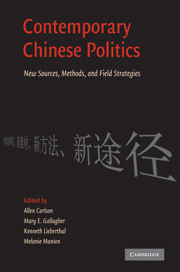Book contents
- Frontmatter
- Contents
- Tables and Figures
- Contributors
- Abbreviations
- Introduction
- Part I Sources
- 1 State-Generated Data and Contentious Politics in China
- 2 Why Archives?
- 3 The Central Committee, Past and Present
- 4 Experimental Methods and Psychological Measures in the Study of Chinese Foreign Policy
- 5 Internet Resources and the Study of Chinese Foreign Relations
- 6 Information Overload?
- Part II Qualitative Methods
- Part III Survey Methods
- Reflections on the Evolution of the China Field in Political Science
- Glossary
- References
- Index
4 - Experimental Methods and Psychological Measures in the Study of Chinese Foreign Policy
Published online by Cambridge University Press: 05 June 2012
- Frontmatter
- Contents
- Tables and Figures
- Contributors
- Abbreviations
- Introduction
- Part I Sources
- 1 State-Generated Data and Contentious Politics in China
- 2 Why Archives?
- 3 The Central Committee, Past and Present
- 4 Experimental Methods and Psychological Measures in the Study of Chinese Foreign Policy
- 5 Internet Resources and the Study of Chinese Foreign Relations
- 6 Information Overload?
- Part II Qualitative Methods
- Part III Survey Methods
- Reflections on the Evolution of the China Field in Political Science
- Glossary
- References
- Index
Summary
Do concerns over “face” play a greater role in Chinese than American foreign policy? What is the nature of Chinese national identity? Can it be empirically measured and compared to other national identities, and is it consequential for foreign policy outcomes? For instance, how do Chinese patriotism and nationalism compare with, say, American patriotism and nationalism?
This chapter argues that experimental methods and psychological measures provide valuable tools to the political scientist interested in answering such questions. Experiments have long been the first choice for establishing causality in the hard sciences. The social sciences are catching on, with psychology and behavioral economics leading the way. Political scientists, led by Americanists interested in voting behavior, are beginning to follow suit (Druckman et al., 2006). International relations scholars have taken notice. As Rose McDermott (2006: 356) has recently argued, “experiments offer a unique opportunity to make a clear causal argument … which is why it has been differentially adopted by the hard sciences, psychology, and behavioral economics as the gold standard method of choice.” It is the random assignment of subjects to experimental and control conditions that allows analysts to be confident that variation between groups of subjects on dependent measures was “caused” by variation in the independent variables that were manipulated. By contrast, the majority of quantitative work in political science, which is based on research designs that are correlational in nature, cannot confidently make causal claims.
- Type
- Chapter
- Information
- Contemporary Chinese PoliticsNew Sources, Methods, and Field Strategies, pp. 69 - 87Publisher: Cambridge University PressPrint publication year: 2010
- 3
- Cited by



